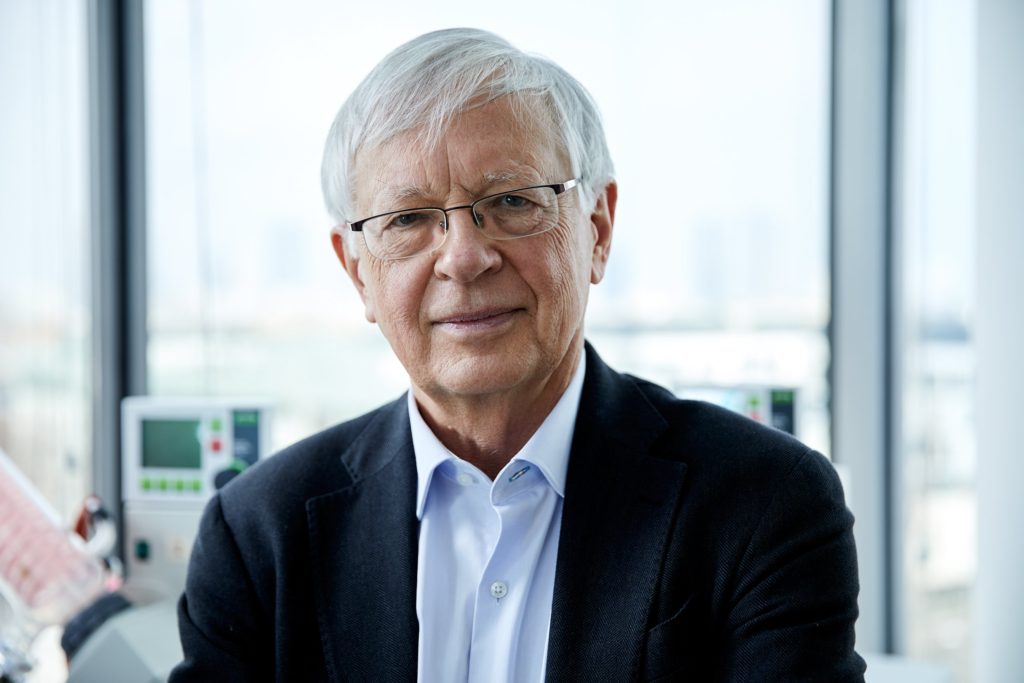Edward Darżynkiewicz, after graduating from the 2nd Secondary School in 1965. Adam Mickiewicz in Skarżysko-Kamienna, in 1965-1970 he studied at the Faculty of Chemistry of the University of Warsaw. His interest in issues at the border of chemistry, biology and physics resulted in him completing his master’s thesis at the Department of Biophysics, at the Institute of Experimental Physics, Faculty of Physics, University of Warsaw, under the supervision of Prof. David Shugar. Prof. Shugar was also the supervisor of his doctoral thesis, defended in 1976.
In 1978, Edward Darżynkiewicz went on a long-term postdoctoral fellowship to Aaron Shatkin’s laboratory at the Roche Institute of Molecular Biology in Nutley. In 1975, Aaron Shatkin made the groundbreaking discovery of a unique cap structure at the 5′ end of reovirus mRNA, which had a profound impact on our understanding of mRNA biogenesis. Edward Darżynkiewicz began research of cap. After returning to Poland in 1980, where the opportunities for scientific development were more than modest, Edward Darżynkiewicz decided to continue the research started with Shatkin, and his idea was to chemically modify caps and use modified caps in various types of biological and biophysical research. It was very difficult, given the overwhelming powerlessness in Poland at that time, but the idea turned out to be a “bull’s-eye”. This idea twenty years later made him one of the most recognizable researchers from the University of Warsaw in the world and allowed him to be called one of the most outstanding Polish scientists at the turn of the 20th and 21st centuries. The research he initiated led to the discovery of a way to increase the durability of mRNA, which resulted in one of the largest commercializations of science in Poland. In December 2010, a license agreement was signed with the pharmaceutical company BioNTech AG from Mainz (Germany), covering the exclusive right to use inventions covered by patents entitled “Synthesis and use of anti-reverse phosphorothioate analogs of the messenger RNA cap” and “mRNA Cap Analogs”, in therapeutic applications (development of a new generation of anticancer vaccines based on cell-stable mRNAs). For discoveries related to these patents, Prof. Jacek Jemielity, Prof. Edward Darżynkiewicz, Joanna Kowalska, PhD and a collaborating team of scientists from the University of Warsaw received a nomination for the European Inventor Award in the research category in 2018, for the invention of “messenger RNA with increased stability”.
Professor Edward Darżynkiewicz was the co-author of 192 publications cited over 6,000 times (according to the SCOPUS database), and was awarded the medal. Leon Marchlewski for outstanding achievements in the field of molecular biology and many other awards. He collaborated with the most outstanding mRNA researchers in the world, such as Robert E. Rhoads (Louisiana State University), Ugur Sahin (Johannes Gutenberg University of Mainz), Nahum Sonenberg (McGill University), Stephen Cusack and Iain Mattaj (European Bioinformatics Institute), Thomas Preiss ( Australian National University), Janusz M. Bujnicki (United Way) and Ryszard Kierzek (Polish Academy of Sciences). Edward was a great colleague and mentor of young people starting their scientific careers. He liked Masuria very much, where he had a second house (in Stawiguda) next to the one in Izabelin near Warsaw. He also liked traveling. We express our deepest condolences to his wife, Krystyna, and his sons, Zbyszek and Miłosz.
Jan Antosiewicz



